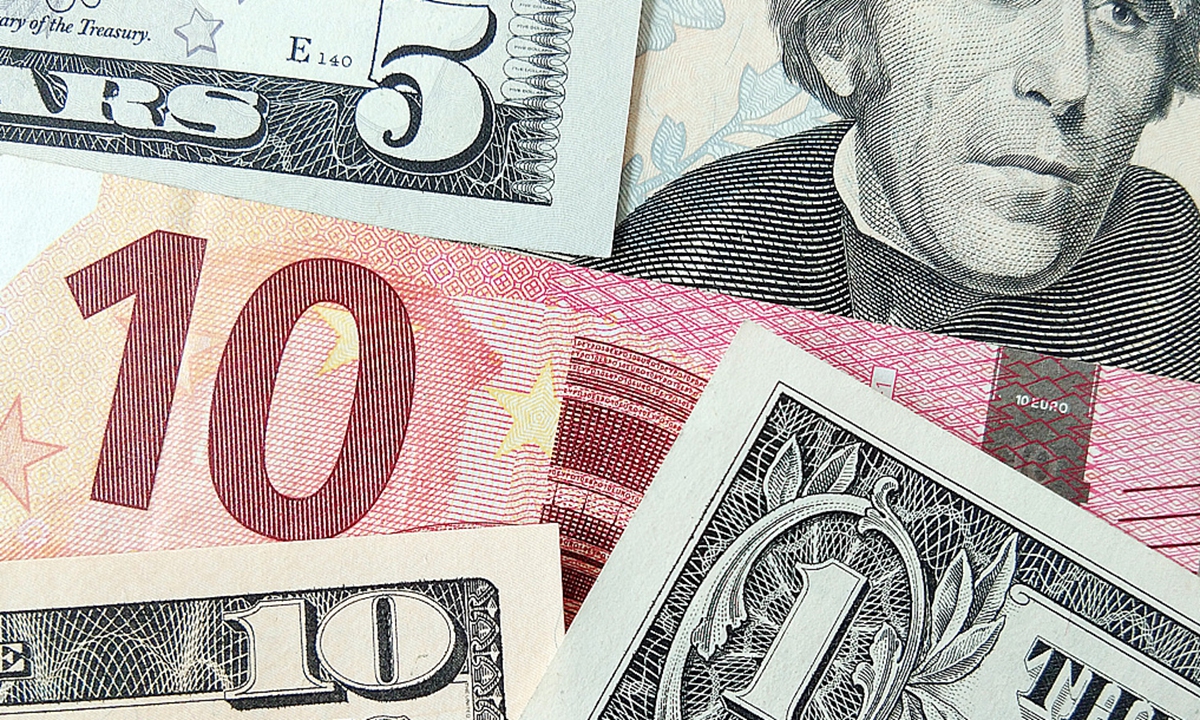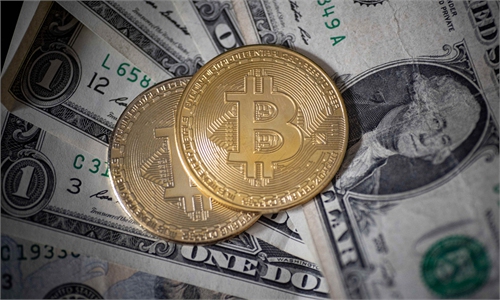US financial sanctions on Russia cause havoc on global financial market, to shake the dollar’s position
US sanctions on Russia cause havoc on global markets

Dollars vs Euro.File Photo:VCG
As Russia and Ukraine engage in a military conflict, the Biden administration has thrown a number of "financial bombs" at the Russian government.
In its first foray, the US government froze the assets of a number of large Russian banking institutions including Sberbank, Russia's largest financial institution, and VTB Bank, the country's second largest financial institution, by severing their access to transactions made in US dollars. At the same time, the US also placed sanctions on a good number of Russian elites and their family members.
Subsequently, the US government persuaded some of its allies to remove selected Russian banks from the SWIFT system, the payment system used by most international financial transactions.
In the latest round of sanctioning measures against Russia, four US officials introduced a bill to prevent Russia from using its $130 billion in gold reserves abroad, according to a report by website thehill.com on Tuesday.
Whether the US government will follow up with more punitive measures or if those existing financial sanctions could achieve their desired effect is not clear but one thing is certain, that the global financial markets have been severely rattled by such concentrated and capricious use of weaponized financial sanctioning measures, with global stock markets plunging and the Russian ruble hitting a new low.
Tightening sanctions
Although the news of Russia being driven out of the SWIFT financial settlement system attracted a lot of attention, experts told the Global Times that the impact from assets freezing is even more acute.
"If the removal of Russia from SWIFT is a financial nuclear bomb, the freezing of Russia's overseas assets is even more direct and will have a stronger impact," an anonymous financial industry insider told the Global Times.
Once the Russian banks' US dollar assets are frozen, all of their US dollar denominated financial assets, including the US dollar deposits, and other securities can no longer be transferred, traded or used. That means those assets have become just like a number on a spreadsheet instead of "real money".
The freezing occurs instantly after the announcement of the sanction is made, giving Russian banks no time to transfer their assets, the industrial insider said.
Different from the SWIFT ban, the assets freezing is imposed by the Office of Foreign Assets Control (OFAC) under the US Department of the Treasury by means of a list called Specially Designated Nationals and Blocked Persons List. The list features an extended roll of Russian people and institutions, the last being one entity called ZIL- M.
Lin Jiang, a professor of economics at Sun Yat-sen University, said that the majority of Russia's foreign exchange currencies are reserved in overseas commercial banks to facilitate import payments, and freezing of Russian banks' overseas assets means that their imports have been largely cut off.
Data provided by Xu Wenhong, deputy research fellow under the Institute of Russian, East European & Central Asian Studies under the Chinese Academy of Social Sciences, showed that by February 18, Russia's central bank had about $643 billion of foreign reserves, of which $311 billion is stored in the form of overseas securities, while $152 billion was deposited in overseas banks. Russia also holds around $132 billion in gold reserves.
Lü Xiang, a research fellow at the Chinese Academy of Social Sciences, said that the actual scale of the Russian overseas assets being frozen by OFAC is unclear. "They should contain assets coming from Russia's earlier energy exports that have not been settled. But the move shows that the US' intention to corner Russia's economy is clear to all," he told the Global Times.
According to Lü, there's a lot of public information about the US freezing Russia's overseas assets, but nothing is said about their implementation and the effects of those measures.
"There's a possibility that Joe Biden is showing his hardcore posturing on global issues to American voters, in order to rescue his falling public support rate," he said.
US hegemony
According to Chinese experts, the US' financial sanctioning measures against Russia is just one manifestation of the country's repeated use of "financial weapons" in recent years to crack down upon other governments, and the premise of such sanctions is the widespread usage of the US dollar around the world as well as the US-led financial infrastructure like SWIFT.
"The world has been reliant upon the US dollar because of the credit of the US dollar settlement system, which is established through the influence of the US economy as well as the Wall Street's financing capabilities," Lin said.
However, experts diverged as to how long the situation could last, as some said the credit of the US dollar is facing scrutiny after the US abused the dollar's usage as a financial 'weapon' instead of a trusted global currency.
"The US is trampling upon its own free market ideal by abusing the US dollar's credit. If Russia succeeds in withstanding the US financial sanctions, it might mean the end to an era where the US dollar dominates the global payment and trade settlement system," Dong Dengxin, director of the Finance and Securities Institute at the Wuhan University of Science and Technology, told the Global Times.
According to Dong, the fallout of the US financial sanctioning measures has already emerged, including the recent disruptions on the global stock markets, but that is nothing compared to the long-term erosion of the US credit, as people will question about the safety of letting their capital flowing into the US markets.
"Global investors should look for a new safe haven for stocking their assets," he said. "The trend of capital outflow [from the US] is likely to be a long-term phenomenon," he said.
But Lin still thinks that the role of the US dollar will be very hard to challenge in the near future, as no other currencies can achieve the same level of free convertibility enjoyed by the US dollar.
Global Times



